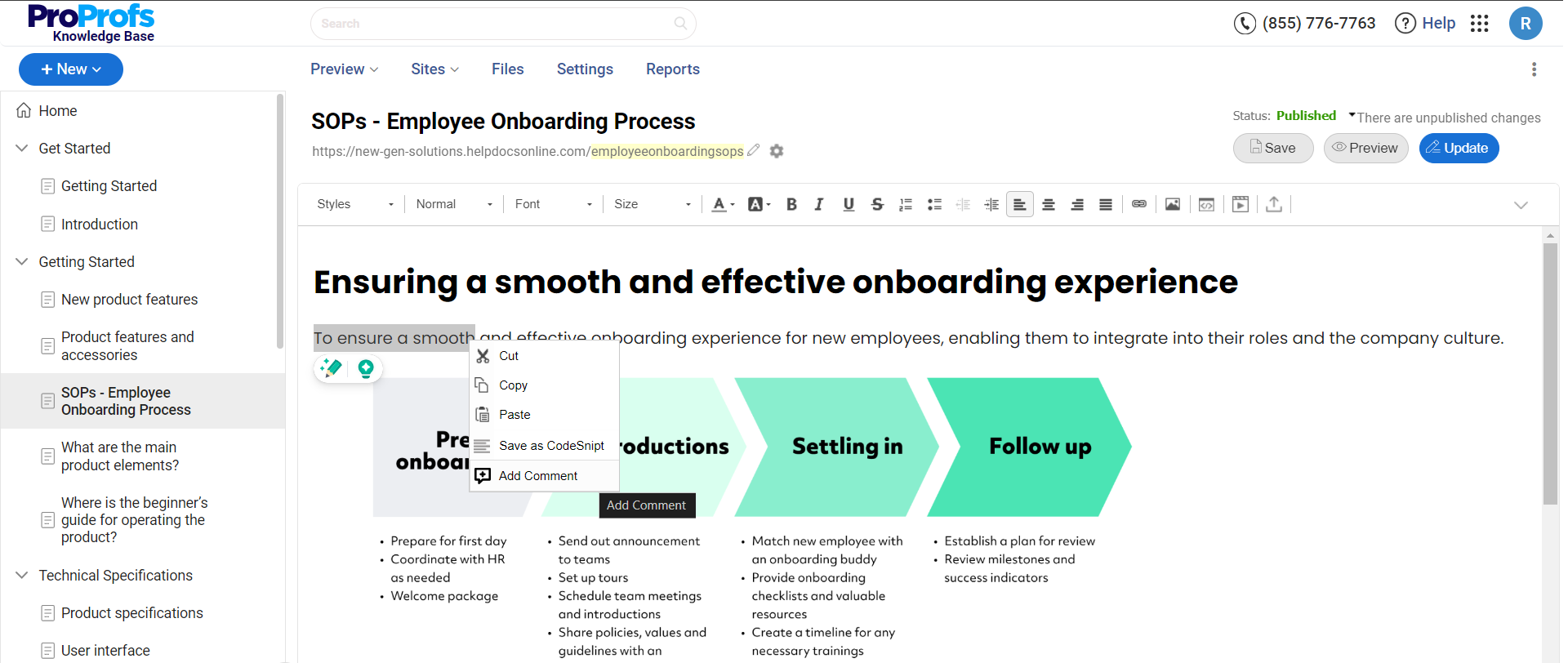Take products in any industry, and you will find they are almost identical, with just a few minor differences.
With such similar products, convincing customers that your product offers unparalleled value and can help them solve real problems is an uphill battle. Such convincing demands more than just customer service skills or shiny marketing campaigns.
Regular employee training is paramount for product success. It helps your teams paint a positive picture of your product and demonstrate the difference it can bring in your customers’ lives.
A sales team can make an amazing pitch and close deals faster only when they know the product in and out!
A support team can point customers to practical solutions only when they have a firm understanding of how a product functions!
It is this deep product knowledge that helps employees make informed decisions that are in your customers and your company’s best interest.
That’s precisely why product knowledge training is vital for achieving ultimate customer delight.
This product knowledge training guide will take you through every little detail regarding the importance of product training and how it can be imparted to employees.
What is Product Knowledge Training?
Product knowledge training is designed to impart in-depth product knowledge to employees across departments. With the right knowledge, employees are better positioned to market and sell your products, support customers, and put your brand in a favorable light.
This is true, especially for customer-facing teams who are always on the frontline, answering customer questions and looking for opportunities to leave a lasting brand impression.
As a comprehensive learning program, product training focuses on imparting holistic knowledge about:
✔ what your products are?
✔ how is the function of your product?
✔ what benefits do they provide, and
✔ what value do they bring to the world?
What are the Different Types of Product Knowledge Training?
Now that you know the meaning of product knowledge training, let’s explore its types.
Based on your business and your employees’ preferences, you can opt for a suitable training technique from the below list:
1. Let Employees Use Your Products
The best way to learn about a product is to use it. No amount of theory can replace the practical knowledge employees can gain by using the product on their own. When they use your product, they will know the benefits it offers as well as the hurdles it throws at certain points.
2. Leverage Videos
The product knowledge training activities should not be boring or mundane for employees. If that’s the case, employees will soon lose interest in your product. You can use visuals such as engaging knowledge base videos, infographics, or images to make the learning process more interactive.
3. Create Product Documentation
Create product documentation that is accessible across devices can make product knowledge training convenient and hassle-free for employees. Such a document comprises detailed articles on the product’s features, functionality, use cases, and a lot more. Employees can refer to the project document and learn at their own pace.
4. Provide Bite-Sized Training Sessions
Expecting employees to gobble down all product information at once is unreasonable and futile. Employees will only be completing a formality while learning very little about your product. Instead, adopt a slow and steady approach with bite-sized training sessions. Such training is easier to digest and allows employees to retain the information for a long time.
5. Conduct Product Training Throughout the Year
It’s natural for employees to forget what they learn in a training session 3 or 6 months down the line. And in this period, your product might witness multiple developments with the roll-out of new features or the addition of advanced functionality.
Taking refresher training throughout the year keeps employees aligned with the latest product updates. This is also a good way to help employees refresh everything they had learned in the previous sessions.
Why is Product Knowledge Training Crucial for Your Employees?
There are zillions of products on the market, each vying for customers’ attention.
As a growth-focused business, your aim should be to grab as many eyeballs as you can and let customers successfully use your products.
For that, your customer-facing teams as well as the strategy-building staff should know your product inside-out.
Product knowledge training works with the aim to turn employees into product experts so that they can confidently communicate your product’s USPs, demonstrate its benefits, and address customer problems.
All of this combined translates into an impeccable customer service knowledge base and beautiful experiences, which is the aim of every business, be it a small startup or a Fortune500 company.
Top Benefits of Product Knowledge Training
Now that you know the importance of product knowledge training, let’s explore some of its most significant benefits:
1. Close Deals Faster
With the right product knowledge up their sleeves, your sales team will be better prepared to make high-converting sales pitches that clearly communicate the value of your products. They will know how to present your product’s features and which benefits to highlight in order to leave a positive impression on prospects.
2. Delight Customers With Stellar Support
One of the key advantages of product knowledge training is to delight customers with superior services. The right training can help your support staff answer customer questions quickly and accurately. Agents will have all product essentials on the tip of their tongues, which will help them drive every customer conversation toward a positive outcome.
Thorough knowledge of the product will also help agents create upselling and cross-selling opportunities, thus improving your bottom-line results.
3. Boost Your Brand’s Credibility
A fumbling agent unsure about your product’s features and benefits can be a big turn-off for prospects. All your efforts to pique the interest of prospects through your website’s content will come down to nothing.
By imparting product knowledge and skills, your sales reps will be well-prepared to answer questions as product experts. It will help them stay confident during conversations and build a positive brand building.
4. Get Valuable Feedback From Employees
Product knowledge training for employees across departments will open doors for valuable insights, ideas, and suggestions. Every employee will feel differently about the product and will have something unique to share. The ideas and insights they offer can be instrumental in further improving your product.
Not just this, having a fresh pair of eyes on your product is a good way to identify points of friction and problematic features that you couldn’t spot in the first place. Training sessions will provide employees an opportunity to share insightful feedback and take your product quality to a whole new level.
FREE. All Features. FOREVER!
Try our Forever FREE account with all premium features!
Objectives of Product Knowledge Training for Different Teams
Product knowledge training serves different purposes for different teams.
All these purposes circle back to a single business objective – Driving better business results!
In this section, we will learn about the individual objectives of this training for different teams and departments.
1. Customer Support Team
Your support staff is the one that works on the frontline handling the anger and frustration of customers. It’s a high-pressure role that requires complete command of the product, right from its features and functionality to its use cases, pricing, and everything in between.
For example, if a customer raises a complaint about a glitchy feature of a newly-purchased microwave, your customer support team should be capable of delivering a quick solution. The agent should make the resolution process as seamless as possible by either solving the issue himself or transferring it to a subject matter expert.
To turn your support staff into product experts, their training should cover the following:
✔ All product essentials including their features, benefits, and use cases
✔ Technicalities of the product
✔ How to troubleshoot certain issues
✔ Questions frequently asked by customers and how to answer them
2. Sales Team
Sales teams need product knowledge training to talk confidently about your product and convince prospects of the value it can bring to their lives. When your sales reps have a solid grasp of your product, they will be in a favorable position to answer even the most complex questions raised by prospects.
The sales team’s product training should cover:
✔ The basic details of your product
✔ The USPs of your product
✔ The different use cases of the product
✔ Price plans, discounts, and current offers
✔ How your product performs in comparison to your competitors
3. Marketing Team
The marketing team works behind the curtain to give your products the push they need to shine.
They create campaigns with the best customer service tools to boost product visibility, build a loyal customer base, and drive more sales.
Without the right knowledge at their disposal, marketing campaigns can go terribly wrong and turn into product graveyards.
Here’s what the product training for your marketing team should focus on:
✔ Basic details about your product
✔ Customer pain points that the product can solve
✔ New feature updates
4. Product Development Team
Product-facing teams are directly involved in the product creation process. They take care of everything right from a product’s features and design to its use cases and other technicalities.
If we take the example of a SaaS product, there are developers working at the back end and doing all the groundwork. Imparting the right training on what the product is about and which features to include will keep developers on the right track from the start.
The same goes for your Quality Assurance teams, who test the product before it hits the market. With solid training, this team will know which areas to analyze and which problems to look for while running the quality test.
The training for your product-facing teams should cover:
✔ All critical details of your product
✔ Product technicalities
✔ Use cases, features, and functions
Actionable Tips to Impart Product Knowledge Training to Your Employees
Product knowledge training initiatives will bring substantial value to your business, only when executed the right way.
Follow these practical best practices and turn your product knowledge training ideas into a reality.
1. Tailor the Training for Employees Across Departments
Every employee needs product training for a different purpose.
For the marketing department, the goal can be to build an impeccable marketing campaign that elevates the product’s visibility on the market. For your sales team, the goal can be to exude confidence during interactions with prospects and win deals faster.
On the contrary, your support team needs product training to confidently solve complex problems and win customers’ trust.
Whenever you think of how to develop product knowledge training that hits all department-specific goals, remember that tailoring the training program to serve different needs is key.
Custom-built training programs help employees practically apply the learning in specific scenarios and achieve the results they desire. Such programs offer learners an engaging and personalized experience, helping them process the information faster.
2. Build a Convenient 24×7 Learning Environment
Product knowledge training shouldn’t seem like an added responsibility for employees. Instead, it should be seamlessly integrated with their workflows, so that they can take up the training conveniently and learn at their own pace.
The idea is to make learning a continuous, 24×7 process to ensure that employees are always up to date with the latest product information.
Deploying the best knowledge base software and employee handbook tools can turn this into a reality. It can be used to create an employee self-service portal or internal knowledge base, with all necessary information neatly structured across categories.
With quick access to how-to training videos, detailed product-related articles, and FAQs under one roof, employees don’t have to waste time scrambling for information.
All product essentials employees need are available on a single platform. This allows teams to get real-time assistance whenever they are stuck and align learning with their short and long-term goals.
Looking at today’s remote work environment, such on-the-go learning is highly beneficial. Employees working remotely can get their hands on the latest product information through a device and at a time of their preference.
Here’s a short video that gives a glimpse into the process of creating a self-service portal with the knowledge base software.
3. Create Online Courses for an Immersive Training Experience
Two significant pillars of product knowledge training are accessibility and convenience.
Training that feels burdensome and difficult to digest is of no use to employees. Instead of learning, they will be simply fulfilling a responsibility, ticking off the box just for the heck of it.
With interactive online courses, you can break complex training into bite-sized sessions, all of them working with a single focus – boost learning and improve knowledge retention. Such courses are mobile-friendly so they can be taken up on the go without worrying about time and place.
Online courses are self-paced as learners can stop and resume the training, and even track their progress as they move from one milestone to the next. You can also add interactive elements such as images, videos, presentations, tests, and quizzes to the training courses for a fun learning experience.
To take your product knowledge training to the next level, integrate a self-help knowledge base with your online classroom and give your employees a holistic learning experience.
Want to dig into the details of how to create online courses for employee training? Watch this video, and you will have all your questions answered.
4. Take Regular Feedback to Improve Training Experience
Feedback plays a critical role in tailoring the training experience to employees’ specific needs.
Being at the receiving end, employees can easily spot bottlenecks in a training program. Listen to what they have to say about the learning experience and use their feedback to tailor the training to their specific needs.
Right from the information provided in training programs to the way they are designed, employees will have valuable suggestions to share. Share surveys with employees and encourage them to share honest feedback about the training medium, content, courses, as well as the performance of instructors.
Such insights will open doors for you to revisit your training programs from time to time and undertake strong measures. This will ensure that employees keep receiving a top-notch training experience that caters to all their learning needs.
Read More: 110+ Training Survey Questions to Ask for Valuable Feedback
5. Leverage Quizzes to Analyze Training’s Effectiveness
You have created a stellar training course but how do you gauge its effectiveness and success rate?
Quiz Maker offers the best way to check how deeply your training courses have engaged employees and how well they have grasped all the concepts.
You can make the process of analyzing training’s effectiveness and knowledge retention fun and easygoing by adding a variety of quizzes to your online courses. From scored quizzes and multiple-choice questions to true/false and matching answers, pick a quiz type that is best to gauge learners’ command over a specific subject.
The best part is quizzes come with automatic grading. This means you can get details like the total score of employees, their pass and fail status, as well as total correct and incorrect answers, without putting in any manual effort.
These insights will help you analyze not only the performance of employees but also the effectiveness of your training programs. The better learners perform, the more impactful your training courses are, and vice versa.
Here’s a quick video to guide you through the process of creating quizzes for your employees.
Turn Your Employees Into Product Experts
Product knowledge training is a solid way to educate employees about your products and help them interact confidently with customers.
What’s important to note is that such training programs should be closely tied to your employees’ workflow so that they don’t take it as a burden. They should willingly participate in the training programs and look at it as a value-adding exercise.
There are several ways to impart this training to employees.
For example, you can create online courses, make use of quizzes, or even create an employee handbook comprising product information in detail.
Whichever route you choose, ensure that it is mobile-responsive and lets employees learn conveniently with no hassles of time and place. With this as your goal, it will be good to deploy suitable product knowledge training tools such as ProProfs Knowledge Base and ProProfs Training Maker. These tools are designed to help you conduct product training in a way that’s fun, engaging, and convenient.
 Tips
Tips
We’d love to hear your tips & suggestions on this article!
FREE. All Features. FOREVER!
Try our Forever FREE account with all premium features!



 We'd love your feedback!
We'd love your feedback! Thanks for your feedback!
Thanks for your feedback!







